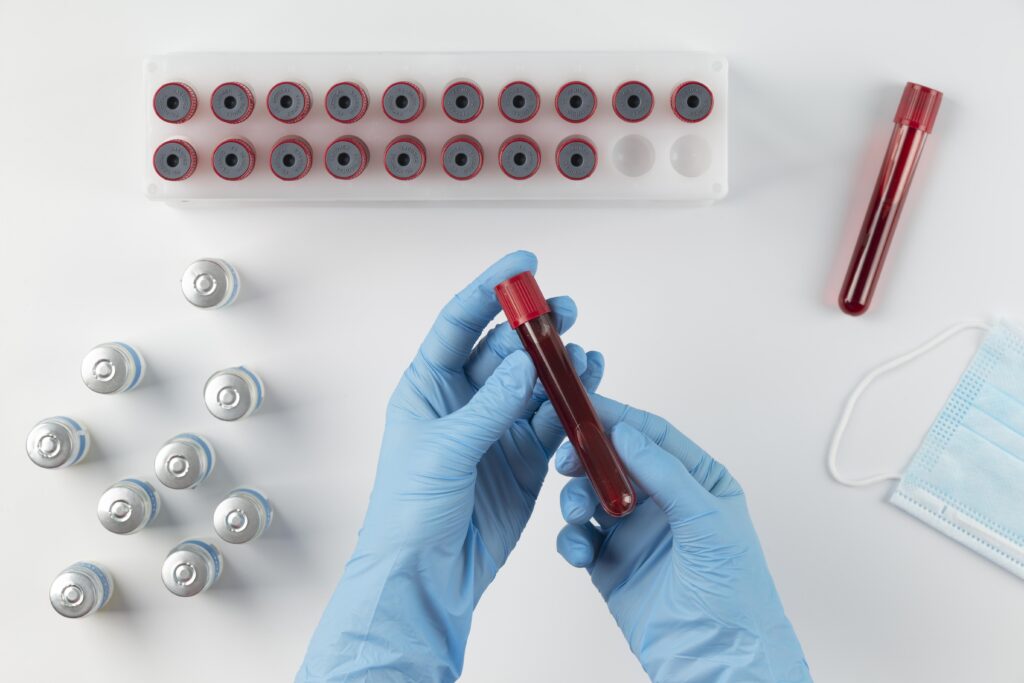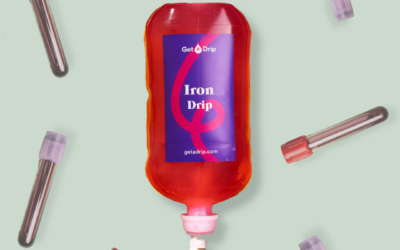
It is no secret that blood is essential to life and is what keeps our body going. It carries out one of the most important functions by delivering essential substances like oxygen and nutrients to our cells and so much more! Our blood, in a way, carries the code for the rest of our body and vital organs. For example, if there is an issue within our body, our blood is able to pick it up and is the key for detecting any abnormalities. So why is blood testing so important? Having an annual screening/blood test is one of the most efficient ways to prevent any sort of degenerative illness by catching it early so it can be managed most effectively. Keep reading to find out more about our Complete Blood Analysis Test!
What does our Complete Blood Analysis test for?
Diabetes check: Test for HbA1c and glucose levels (also known as blood sugar levels) to see if it is higher than the range that is healthy for you. HbA1c reflects how well blood sugar is controlled in the past 2-3 months.
Kidney function: Test for Estimated glomerular filtration rate (eGFR), Urea, Creatinine, Sodium and Magnesium levels. EGFR is the estimated measure of kidney function and can determine if you have a kidney disease or infection and tell you what stage you are at. Measuring Creatinine levels is important to note as if your kidneys are not working properly, your serum creatinine level goes up.
Bone health: Test for Uric Acid. Uric Acid is a normal waste product that your body makes when it breaks down chemicals called purines. Normal or high levels of Uric Acid is associated with a reduction of bone density, protecting it against bone fracture.
Inflammation marker: Test for C-Reactive Protein (CRP), Creatine Kinase and Prostate-Specific Antigen (PSA). Testing CRP is a way of detecting and diagnosing conditions that cause inflammation, high levels of CRP may be a sign of a serious health condition that is causing this inflammation. PSA is a protein produced by normal prostate cells, it may not be necessarily considered as an inflammatory marker but high levels of PSA may indicate early signs of prostate cancer.
Iron profile: Test for Iron, Ferritin, Transferrin Saturation, Unsaturated iron-binding capacity (UIBC) and Total iron-binding capacity (TIBC). Test to see if you have low levels of Iron, indicating an iron deficiency. If you are Iron deficient or have experienced Iron deficiency symptoms, try our High Dose Vitamin C Drip as Vitamin C increases dietary Iron absorption. Click here to book your High Dose Vitamin C Drip today!
Cholesterol Profile: Test for Cholesterol, HDL Cholesterol, LDL Cholesterol, Non-HDL Cholesterol and HDL:Cholesterol Ratio, Triglycerides, Triglycerides:HDL Ratio. If your test shows that you have high levels of cholesterol, you can take preventative steps to lower it. This may decrease your risk of developing heart problems in the future.
Sex Hormones: Test for Testosterone, SHBG, Follicle Stimulating Hormone (FSH), Luteinizing Hormone (LH), Prolactin, Oestradiol and Progesterone. In women, measuring testosterone concentrations is very common to test to aid in PCOS diagnosis and can be useful when investigating the cause of infertility. Low testosterone levels in males can lead to erectile dysfunction and it can also affect sleep, mood, the size of testicles and more. Please note that women’s hormones will vary depending on their menstrual cycle and if taking a contraceptive pill.
Full blood count: Test for Haemoglobin, Haematocrit, Mean Cell Haemoglobin, MCHC, Mean Cell Volume, Red Blood Cells, Red Cell Distribution, Basophils, Eosinophils, Lymphocytes, Monocytes, Neutrophils, White Blood Cells, Platelets and MPV. Testing your Haemoglobin is often used to check for anaemia, a condition in which your body has fewer red blood cells than normal and your cells in your body do not get as much oxygen as they need. Test white blood cell count is most often used to help diagnose disorders related to having a high white blood cell count. This includes: autoimmune and inflammatory diseases as well as conditions that cause the immune system to attack healthy tissues. Platelets are larger pieces of large cells in your bone marrow, they help form blood clots to aid with wound healing.
Liver function: Test for Alanine Aminotransferase (ALT), Aspartate-Aminotransferase (AST), Gamma-Glutamyl Transferase (GGT), Total Protein, Total Bilirubin, Alkaline Phosphatase (ALP), Albumin and Globulin. Testing your liver function is extremely important as they are used to screen for potential liver damage and are also used to help determine the cause of symptoms such as jaundice that may be due to liver disease.
Thyroid function: Test for Thyroid Stimulating Hormone (TSH), Free Thyroxine (FT4) and Free Triiodothyronine (FT3) . Testing your thyroid hormones may help find the cause of problems such as hyperthyroidism (an overactive thyroid) or hypothyroidism (an underactive thyroid).
Signs and symptoms of hypothyroidism (decreased function of the thyroid) may include weight gain, dry skin, constipation, cold intolerance, puffy skin, hair loss, fatigue, and menstrual irregularity in women.
Signs and symptoms of hyperthyroidism (increased function of the thyroid) may include increased heart rate, anxiety, weight loss, difficulty sleeping, tremors in the hands, weakness, and sometimes diarrhoea. There may be puffiness around the eyes, dryness, irritation, and, in some cases, bulging of the eyes.
Vitamins and minerals: Test for Zinc, Selenium, Vitamin A, Vitamin D, Vitamin E, Vitamin B1, Vitamin B2, Vitamin B6, Vitamin B12, and Serum Folate. Test to see if you are deficient in any of these vitamins and minerals. Common symptoms of a vitamin deficiency include:
- Fatigue
- Weight loss/loss of appetite
- Muscle pain and weakness
- Hair loss
- ‘Brain fog’ and cloudiness
Click here to read more about B12 deficiency and if you could be B12 deficient.
G6PD: Test for Glucose-6-Phosphate Dehydrogenase. G6PD is an enzyme that helps your red blood cells function correctly. Low G6PD levels can lead to a condition called hemolytic anaemia which is a blood condition that occurs when your red blood cells are destroyed faster than they can be replaced.
What are you waiting for? Click here to book your Complete Blood Analysis Test today!
Blood Testing FAQs:
- Why is Blood Testing So Important?
Having an annual screening/blood test is one of the most efficient ways to prevent any sort of degenerative illness by catching it early so it can be managed most effectively
- What does the Complete Blood Analysis Test check for?
Diabetes check, kidney function, bone health, inflammation marker, iron profile, cholesterol profile, sex hormones, full blood count, liver function, thyroid function, vitamins and minerals & G6PD.
- Do I need to do anything to prepare for my Blood Test?
Please do not consume food or drink for 6 hours prior to appointment. This excludes water, please stay well hydrated.
Also avoid strenuous exercise for 48 hours before your appointment.
- How accurate are the results?
Our laboratory partner is one of the largest in Europe and performs all of its work to the highest possible level of quality. They comply with current UKAS standards and applicable regulatory requirements, so diagnostics are delivered with utmost accuracy.
- How long until I receive my results?
For the Complete Blood Analysis Test, you will receive results between 7-10 working days.
- How long does the testing process take?
The procedure of the blood test will take no longer than 20 minutes with the inclusion of completing the required documents beforehand; But additional time can be used for any questions.
- Who is eligible for a Blood Test?
We only offer blood tests to those over 18 years of age. We will not perform blood tests on children.
- Is Get A Drip CQC Registered?
Yes, Get A Drip is CQC Registered. Your sample will also be collected by either an NMC registered nurse, HCPC registered paramedic, or a qualified phlebotomist and reviewed by a GMC registered Doctor.


